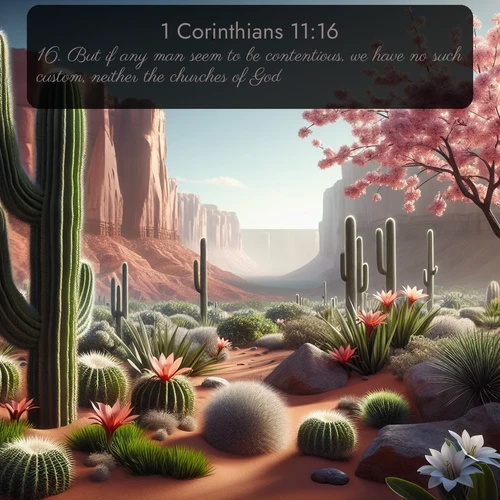1 Corinthians 11:16 plusieurs versions / traductions
English Bible Translations
16. But if any man seem to be contentious, we have no such custom, neither the churches of God.
16. But if any man seemeth to be contentious, we have no such custom, neither the churches of God.
16. But if any man will not be ruled in this question, this is not our way of doing things, and it is not done in the churches of God.
16. But if any one think to be contentious, *we* have no such custom, nor the assemblies of God.
16. But if any man seemeth to be contentious, we have no such custom, neither the churches of God.
16. and if any one doth think to be contentious, we have no such custom, neither the assemblies of God.
German Bible Translations
16. Ist aber jemand unter euch, der Lust zu zanken hat, der wisse, daß wir solche Weise nicht haben, die Gemeinden Gottes auch nicht.
16. Will aber jemand rechthaberisch sein, so haben wir solche Gewohnheit nicht, die Gemeinden Gottes auch nicht.
French Bible Translations
16. Si quelqu'un se plaît à contester, nous n'avons pas une telle habitude, et les Eglises de Dieu non plus.
16. Si quelqu’un se plaît à contester, nous n’avons pas cette habitude, pas plus que les Eglises de Dieu.
16. Si quelqu'un se plaît à contester, nous n'avons pas cette habitude, non plus que les Eglises de Dieu.
16. Mais si quelqu'un paraît vouloir contester, nous, nous n'avons pas une telle coutume, ni les assemblées de Dieu.
16. Que si quelqu'un aime à contester, nous n'avons pas une telle coutume, ni aussi les Eglises de Dieu.
16. Que si quelqu'un se plaît à contester, nous n'avons pas cette coutume, ni les Églises de Dieu non plus.
Versions with Strong Codes
1 Corinthians 11 / KJV_Strong16. But[G1161] if[G1487] any man[G5100] seem[G1380] to be[G1511] contentious,[G5380] we[G2249] have[G2192] no[G3756] such[G5108] custom,[G4914] neither[G3761] the[G3588] churches[G1577] of God.[G2316]
Strong Code definitions
G1161 de/deh a primary particle (adversative or continuative); but, and, etc.:--also, and, but, moreover, now (often unexpressed in English).
G1487 ei/i a primary particle of conditionality; if, whether, that, etc.:--forasmuch as, if, that, (al)though, whether. Often used in connection or composition with other particles, especially as in 1489, 1490, 1499, 1508, 1509, 1512, 1513, 1536, 1537. See also 1437. see G1489 see G1490 see G1499 see G1508 see G1509 see G1512 see G1513 see G1536 see G1537 see G1437
G5100 tis/tis an enclitic indefinite pronoun; some or any person or object:--a (kind of), any (man, thing, thing at all), certain (thing), divers, he (every) man, one (X thing), ought, + partly, some (man, -body, - thing, -what), (+ that no-)thing, what(-soever), X wherewith, whom(-soever), whose(-soever).
G1380 dokeo/dok-eh'-o a prolonged form of a primary verb, doko dok'-o (used only in an alternate in certain tenses; compare the base of G1166) of the same meaning; to think; by implication, to seem (truthfully or uncertainly):--be accounted, (of own) please(-ure), be of reputation, seem (good), suppose, think, trow. see G1166
G1511 einai/i'-nahee present infinitive from G1510; to exist:--am, was. come, is, X lust after, X please well, there is, to be, was. see G1510
G5380 philoneikos/fil-on'-i-kos from G5384 and neikos (a quarrel; probably akin to G3534); fond of strife, i.e. disputatious:--contentious. see G5384 see G3534
G2249 hemeis/hay-mice' nominative plural of G1473; we (only used when emphatic):--us, we (ourselves). see G1473
G2192 echo/ekh'o,/including/an/alternate/form a primary verb; to hold (used in very various applications, literally or figuratively, direct or remote; such as possession; ability, contiuity, relation, or condition):--be (able, X hold, possessed with), accompany, + begin to amend, can(+ -not), X conceive, count, diseased, do + eat, + enjoy, + fear, following, have, hold, keep, + lack, + go to law, lie, + must needs, + of necessity, + need, next, + recover, + reign, + rest, + return, X sick, take for, + tremble, + uncircumcised, use.
G3756 ou/oo, also (before a vowel ouch ookh a primary word; the absolute negative (compare 3361) adverb; no or not:--+ long, nay, neither, never, no (X man), none, (can-)not, + nothing, + special, un(-worthy), when, + without, + yet but. See also 3364, 3372. see G3361 see G3364 see G3372
G5108 toioutos/toy-oo'-tos (including the other inflections); from G5104 and 3778; truly this, i.e. of this sort (to denote character or individuality):--like, such (an one). see G5104 see G3778
G4914 sunetheia/soon-ay'-thi-ah from a compound of G4862 and 2239; mutual habituation, i.e. usage:--custom. see G4862 see G2239
G3761 oude/oo-deh' from G3756 and 1161; not however, i.e. neither, nor, not even:--neither (indeed), never, no (more, nor, not), nor (yet), (also, even, then) not (even, so much as), + nothing, so much as. see G3756 see G1161
G3588 ho/ho, including the feminine to to in all their inflections; the definite article; the (sometimes to be supplied, at others omitted, in English idiom):--the, this, that, one, he, she, it, etc.
G1577 ekklesia/ek-klay-see'-ah from a compound of G1537 and a derivative of G2564; a calling out, i.e. (concretely) a popular meeting, especially a religious congregation (Jewish synagogue, or Christian community of members on earth or saints in heaven or both):--assembly, church. see G1537 see G2564
G2316 theos/theh'-os of uncertain affinity; a deity, especially (with 3588) the supreme Divinity; figuratively, a magistrate; by Hebraism, very:--X exceeding, God, god(-ly, -ward). see G3588
Prédications qui analysent les thèmes 1 Corinthiens 11
Thèmes : Repas du Seigneur; Instructions sur le voileRelated Sermons discussing 1 Corinthians 11
Themes : Repas du Seigneur; Instructions sur le voilesee also: Bible Key Verses ; KJV Bible Images, BBE Bible images

